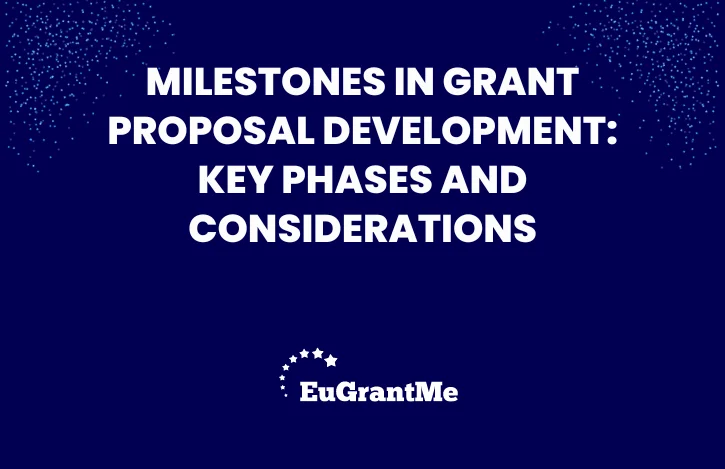The journey of grant proposal development is intricate and demands careful planning and strategic execution. Successfully navigating this journey involves understanding and addressing several critical milestones, each with its own unique challenges and considerations. By mastering these key phases, you can significantly improve your chances of securing the necessary funding for your projects.
Initial Conceptualisation
The first critical phase in grant proposal development is the initial conceptualisation of the project. This stage involves defining the project’s core idea and ensuring it aligns with the funding agency’s goals and priorities. It is crucial to identify the specific problem your project aims to address and articulate the objectives clearly. At this stage, conducting preliminary research to gather evidence supporting the need for your project and its potential impact is essential. This foundational work sets the stage for a compelling proposal that resonates with funders.
Identifying Suitable Funding Opportunities
Once your project concept is well-defined, the next phase involves identifying suitable funding opportunities. This step requires extensive research to find grant programmes that match your project’s objectives and scope. Carefully reviewing the eligibility criteria, funding limits, and submission deadlines for each potential grant is vital. By understanding the funding landscape and discerning which opportunities best fit your project, you can streamline your efforts and focus on the most promising options.
Detailed Proposal Planning
With a clear project concept and potential funding sources identified, the next phase is detailed proposal planning. This involves developing a comprehensive project plan that outlines key activities, timelines, and required resources. A well-structured work plan breaks down the project into manageable tasks, assigns responsibilities, and sets milestones for completion. This level of detail is crucial for demonstrating the feasibility and viability of your project to funders, showcasing your ability to deliver on your promises.
Budget Development
Creating a detailed and realistic budget is a critical component of the grant proposal development process. Your budget should accurately reflect the costs associated with each aspect of your project, including personnel, materials, travel, and indirect costs. It is important to justify each expense and ensure that your budget aligns with the funder’s guidelines and expectations. A well-prepared budget demonstrates your financial planning skills and reassures funders that their investment will be managed responsibly.
Writing the Proposal
The actual writing of the proposal is one of the most crucial phases in grant proposal development. Your proposal should be clear, concise, and compelling, effectively communicating your project’s value and potential impact. It is important to follow the funder’s guidelines closely, ensuring that you address all required sections and include necessary supporting documents. A strong narrative that tells a cohesive story about your project can make a significant difference in how your proposal is received.
Reviewing and Revising
Before submitting your grant proposal, thorough review and revision are essential. This phase involves carefully proofreading your proposal to eliminate errors and ensure clarity. It is also beneficial to seek feedback from colleagues or mentors who can provide a fresh perspective and identify areas for improvement. Revising your proposal to incorporate constructive feedback can enhance its overall quality and increase its chances of success.
Submission Process
The submission process is a critical final step in grant proposal development. It is important to understand the specific submission requirements and procedures for each funding opportunity. Ensuring that all required documents are complete and submitted by the deadline is essential. Adhering to the submission guidelines demonstrates your attention to detail and respect for the funder’s processes.
Post-Submission Follow-Up
After submitting your proposal, it is important to engage in post-submission follow-up. This phase involves monitoring the status of your application and being prepared to respond to any additional requests for information from the funder. Maintaining open communication and demonstrating your ongoing commitment to the project can positively influence the funder’s decision.
Managing Feedback
Whether your proposal is successful or not, managing feedback effectively is crucial. If your proposal is funded, carefully reviewing the feedback can provide valuable insights for project implementation. If your proposal is not funded, constructive feedback can help you identify areas for improvement and refine your approach for future submissions. Viewing feedback as an opportunity for growth and learning can enhance your long-term success in grant proposal development.
Continuous Improvement
Grant proposal development is an ongoing process of learning and improvement. Each proposal you develop and submit provides valuable experience and insights that can inform future efforts. Continuously seeking to improve your skills and strategies in grant proposal development can increase your chances of securing funding over time. Staying informed about best practices and emerging trends in grant writing can also enhance your effectiveness and competitiveness.
Building Relationships with Funders
Building and maintaining positive relationships with funders is an important aspect of successful grant proposal development. Engaging with funders through networking events, conferences, and professional organisations can provide valuable opportunities to learn about their priorities and expectations. Demonstrating your commitment to your projects and their goals can foster trust and support from funders, enhancing your prospects for future funding.
Key Takeaway
The journey of grant proposal development involves navigating multiple critical phases, each with its own set of considerations. From initial conceptualisation and identifying suitable funding opportunities to detailed proposal planning, budget development, and the actual writing process, each step plays a vital role in securing funding for your projects. By mastering these milestones and continuously seeking to improve your skills and strategies, you can enhance your chances of success and make a meaningful impact through your work. Understanding the intricacies of grant proposal development and building strong relationships with funders are key components of a successful funding strategy.
At EuGrantMe, we are passionate about fostering innovation and empowering ambitious minds to flourish. Our mission revolves around providing top-notch grant writing services for the EIC Accelerator and Horizon grants in Europe, enabling our customers to unlock the full potential of their ground-breaking ideas.
Do you have a project to turn into reality?
Contact us!


